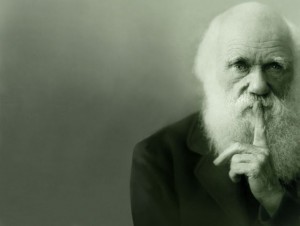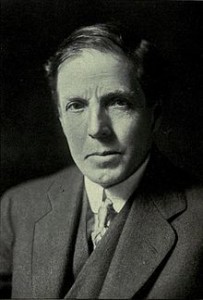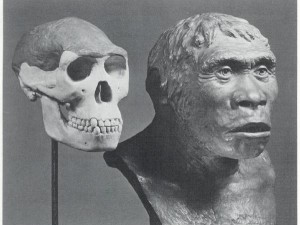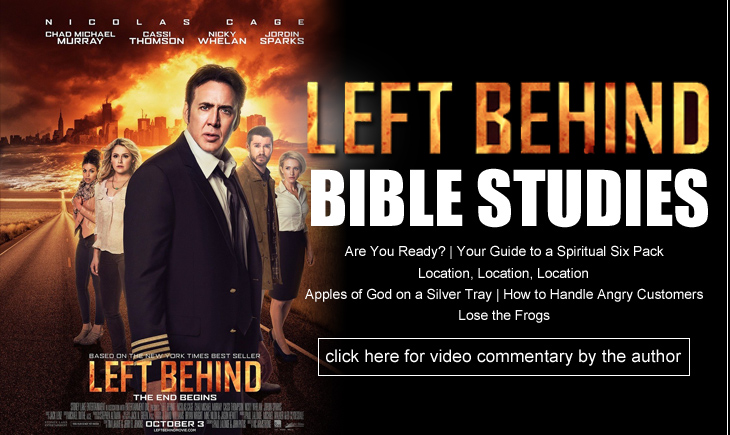 If you’ve never heard “Gravity” by James Brown, you need to check it out. That is some sanctified funk, right there!
If you’ve never heard “Gravity” by James Brown, you need to check it out. That is some sanctified funk, right there!
So, here’s my thought: Darwin’s theory of evolution is based on the idea that the species that are in existence today originated from a single life form. He says as much in his book “Origin of Species:”
…all the organic beings which have ever lived on this Earth may be descended from some primordial form.
Now, before we go any further, let’s clarify a couple of things about the subject we’re about to engage:
First off, those who subscribe to Darwin and his Theory of Evolution can be grouped into two distinct categories:
• the first group is purely scientific in that they don’t associate anything spiritual or metaphysical with this debate. They’re simply attempting to decipher what it is that constitutes the most plausible explanation for the origin of the cosmos and life as we know it. They’re not personally invested in any one theory to the point where if they’re confronted with evidence that elevates one theory over the other, they don’t perceive it as an intellectual assault or a personal affront. Rather, they’re just considering the different viewpoints that exist as though they were perusing the various food items at the local Farmer’s Market.
• the other group has a far greater stake in the discussion in that they recognize its philosophical essence. Should man be nothing more than the byproduct of random chemical and genetic interactions, then he is at liberty to define every aspect of his existence. There are no Absolutes, morality is relative and the quality of one’s life is defined based on whatever criteria best matches their personal preferences. Should the concept of a personal Creator be introduced into the mix, then you have accountability as well as a standard to consider. Convinced that a supernatural explanation for the origin of life inevitably includes an uncomfortably limiting and intrusive dynamic, the disciples of Darwin resolve to refuse any notion of a god resulting in the boundaries of sound scientific reasoning sometimes being stretched and the rules governing a respectful, academic discussion occasionally being suspended.
But it’s needful to recognize that Evolution is not a sound scientific theory. However volatile a topic it may be for some, the ramifications are too significant to gloss over as inconsequential. The manner in which the curtain closes on this issue determines an individual’s philosophical disposition towards God – whether He is or isn’t. That being the case, let’s take a look at Darwin and consider three of the main shortcomings of Darwinian thought as well as the defense the advocates of Darwinism present as a rebuttal.
An Anglican Naturalist…

Charles Darwin
Charles Darwinlived from 1809-1882. The son of a medical doctor, Darwin started his formal education with an aim towards following in his father’s footsteps, but his interest in botany and natural history became so intense that his studies began to suffer. His father responded by sending him to Christ’s College in England where it was determined that he would become an Anglican priest. Darwin did well and graduated in 1831.
Not long after, however, Darwin joined some friends aboard the HMS Beagle. The ship’s mission was to chart the coastline of South America. Darwin was to go on this two year voyage as an amateur naturalist and collect specimens and make observations.
The two year voyage became a five year enterprise. During this time, Darwin excelled. His copious notes and detailed observations were sent home and circulated among those who could appreciate his work. By the time the Beagle returned home, Darwin was already a popular figure within the British Naturalist community and any thoughts of pursuing the ministry were sidelined by, not only his passion for science, but also his ever increasing skepticism when it came to the accuracy of Scripture.
At Every Turn
Darwin’s experiences aboard the Beagle culminated in a theory he elaborated on in his book “Origin of Species.” Published in 1859, it caused a sensation both within scientific and theological circles. It challenged the accepted notion that the world was a created entity. And while much of his theory was conjecture, it became the primary intellectual foundation upon which atheists built their platform.
While Darwin refrained from elaborating on the theological implications of his ideas, there was no denying that if you extended his line of reasoning to its inevitable conclusion, the result was a “god-less” universe. This is why the Theory of Evolution inspires such passionate debate. At the end of the day, you have an amateur Naturalist with a degree in theology who proposes a credible sounding theory about the origin of life based on his extensive observations of the natural world. By itself, it’s not that significant. But because of the philosophical and theological machinations it put in motion, it’s a zealously guarded cornerstone in the mind of the individual who is decidedly secular and a heretical school of thought to the believer.
For the individual resolved to highlight the flaws in Darwin’s reasoning, they have before them a task that’s not as easy as it might appear. While there are flaws in his reasoning, his verbiage is compelling and his ideas resonate on the surface as sensible. And Darwin was thorough in his notes and observations. Even when he seemed on the threshold of conceding some scientific shortcomings, he was careful to provide for himself a theoretical escape that allowed him to keep his hypotheses intact.
For example, in a letter to his friend Dr. Asa Gray in 1857 he says:
It is extremely kind of you to say that my letters have not bored you very much, and it is almost incredible to me, for I am quite conscious that my speculations run quite beyond the bounds of true science.2
Those who might jump on a comment such as this in order to “catch” Darwin doubting the authenticity of his theories will be quickly countered by the champions of Darwinian thought by saying he was referring to a specific idea that he had yet to solidify with sound scientific research – that it wasn’t directed to his theory as a whole.3
In another instance, Darwin referenced the complexity of the human eye as being so intricate, that to speculate it had evolved from a chaotic scenario into the precise instrument that is today was “absurd…”
To suppose that the eye with all its inimitable contrivances for adjusting the focus to different distances, for admitting different amounts of light, and for the correction of spherical and chromatic aberration, could have been formed by natural selection, seems, I freely confess, absurd in the highest degree.4
That would seem to be a dealbreaker right there. But then his advocates go on to point out that while Darwin may have appeared to be bordering on conceding an intellectual flaw, he was merely articulating a preface to his proposed resolution to said quandary:
Reason tells me, that if numerous gradations from a simple and imperfect eye to one complex and perfect can be shown to exist, each grade being useful to its possessor, as is certainly the case; if further, the eye ever varies and the variations be inherited, as is likewise certainly the case and if such variations should be useful to any animal under changing conditions of life, then the difficulty of believing that a perfect and complex eye could be formed by natural selection, though insuperable by our imagination, should not be considered as subversive of the theory.5
In other words, if you can perceive different types of eyes that represent varying theoretical stages of development and complexity, you have enough in the way of evidence to subscribe to the notion that the eye could have, in fact, evolved from the same primordial soup that all of life originated from.
At virtually every turn you will find Darwin has included a protective clause that prevents his theories from being dismantled. The absence of a fossil record to prove the existence of intermediary life forms is explained away as a result of an “imperfect geological record.” At one point, he says, “If it could be demonstrated that any complex organ existed, which could not possibly have been formed by numerous, successive, slight modifications, my theory would absolutely break down.6 But then he goes on to say that the early stages of said organs are simply not available to examine. In other words, although the evidence doesn’t exist today, his theory is sound enough to assume that it did exist at one point.
This is the nature of the Darwin debate. The objective evidence that can be studied and used to conclusively validate Darwin’s theory of evolution is very limited, yet his conclusions are zealously guarded with either a theoretical look to the future or a quick assertion that any opponent of Darwin is basing their objections on an incomplete analysis of his observations.
Over 150 Years Later…
We are now over 150 years removed from Darwin’s first edition of “On the Origin of Species” and it’s not so much that the same questions remain as much as it’s a situation where the same flaws persist and are even more glaring then they were in 1859.
You would be hard pressed to find a scientist that would balk at the claim that any one species has not underwent some changes over the course of earth’s history. But you do, however, encounter a very sharp division, both in academic circles as well as in the lay community, when you propose the idea that all of life is related, even to the point where human beings can supposedly embrace apes as their predecessors and can look to a fruit fly as a distant cousin. That is the core of Darwin’s theory – that is the foundation upon which Natural Selection is built. It’s not whether or not there have been changes within a particular species, but that every species is related having evolved from one common life form:
Analogy would lead me one step further, namely, to the belief that all animals and plants have descended from some one prototype. But analogy may be a deceitful guide. Nevertheless all living things have much in common, in their chemical composition, their germinal vesicles, their cellular structure, and their laws of growth and reproduction. We see this even in so trifling a circumstance as that the same poison often similarly affects plants and animals; or that the poison secreted by the gall-fly produces monstrous growths on the wild rose or oak-tree. Therefore I should infer from analogy that probably all the organic beings which have ever lived on this earth have descended from some one primordial form, into which life was first breathed…7
But if you theory is to have any merit, it has to be consistent with, not only the evidence that currently exists, it also has to conform to the way in which the laws of Nature effect the data you submit. If you’re having to re-tool the rules that govern the natural world in order for your theory to resonate as credible – if you have to contradict the testimony voiced by the artifacts we currently have – you don’t have a scientific theory, rather, you have a cultural myth.
When Christopher Columbus asserted that the world was round, he was basing his
hypothesis on anomalies that could be seen and measured. His proposed voyage was not founded on theories that contradicted the physical givens that could be observed, nor was it dependent upon outrageous claims that could not be validated. Columbus is revered today, not because he went against the grain of true science, but because he had the courage to champion it.
When Christopher Columbus asserted that the world was round, he was basing his hypothesis on anomalies that could be seen and measured. His proposed voyage was not founded on theories that contradicted the physical givens that could be observed, nor was it dependent upon outrageous claims that could not be validated. Columbus is revered today, not because he went against the grain of true science, but because he had the courage to champion it.
Advocates of Darwin like to position themselves as enlightened thinkers and jokingly refer to those who subscribe to Intelligent Design as IDiots. While there are some very educated and articulate Darwinians that can flood the debate with all sorts of biological and chemical minutiae, they are incapable of providing a plausible response to at least three fundamental questions. And the responses they do give, once the imaginary numbers and theoretical values are revealed, do little to convince the unbiased onlooker that theirs is the club consisting of the more intellectually advanced.
Let’s take a look at those three questions.
Those Three Questions
What is Your Starting Point?
In Mathematics a “set” is a group of values. A “Null Set,” or an “Empty Set” has no members. It doesn’t even have the value of zero within it, which makes it a little difficult to envision, but the bottom line is that with the “Null Set,” for lack of a better way of putting it, you have complete nothingness.
However the advocates of Darwin want to insist that the universe and all of life originated from a random collection of raw materials that, by pure chance, combined and interacted in a way that resulted in a single cell organism, they leave out one very important question that deserves an answer: Where did the raw materials come from?
If your evolutionary theory is going to be perceived as having any substance, you can’t assume the pre-existence of the materials you’re going to need in order to construct a more complex life form.
Furthermore, the laws that govern the way in which your raw materials combine and interact with one another do not exist if you start with the cosmological equivalent to the “null set.” If you start with absolutely nothing, not only do you not have the raw materials called for in your theoretical recipe, you’re also lacking the ordered manner in which they relate to one another. Physics, gravity, biology, chemistry – none of these dynamics or their associative properties exist when your starting point is devoid of any kind of system or force that would dictate how that matter would behave. So, regardless of how you attempt to theorize how things may have begun, unless you can first explain the origin of your rudimentary matter as well as the existence of the natural laws that produce the changes you propose, your theory has no worth in that it’s founded on dynamics you can’t account for.
The defense that is made by the proponents of Darwinism is captured in an article that appeared in Discover magazine featuring MIT physicist Alan Guth:
Quantum Theory…holds that a vacuum…is subject to quantum uncertainties. This means that things can materials out of the vacuum, although they tend to vanish back into it quickly…Theoretically, anything – a dog, a house, a planet – can pop into existence by means of this quantum quirk, which physicists call a vacuum fluctuation. Probability, however, dictates that pairs of subatomic particles…are by far the most likely creations and that they will last extremely briefly…The spontaneous, persistent creation of something even as large as a molecule is profoundly unlikely. Nevertheless, in 1973 an assistant professor at Columbia Univeristy named Edward Tryon suggested that the entire universe might have come into existence this way…The whole universe may be, to use [MIT physicist Alan] Guth’s phrase, ” a free lunch.8
At first glance, this looks like a possible explanation as to how the universe could’ve literally “popped” into existence as a result of purely random forces. But there are flaws in this argument on two fronts. First of all, the subatomic particles referenced in the article are theoretical entities and it’s not even clear that they actually exist. Secondly, and even more importantly, a quantum vacuum is not “absolute nothingness.” It’s actually a sea of fluctuating energy – “…an arena of violent activity that has a rich physical structure and can be described by physical laws.”9
So, you still have this huge gap in the Darwinian model in that you have no starting point and can therefore not theorize that matter, let alone a life form, can be initiated without first being able to convincingly explain the origin of your raw materials as well as the laws that dictate the manner in which they relate to one another.
How Do You Account for the Difference Between the Mind and the Brain?
Darwin attempts to explain the origin of a human being as nothing more than a series of physical mutations that, over time, resulted in not just the evolved physique / figure of a person, but also all of the intangibles that make that person who they are; their personality, their will – their conscious self.
To fully appreciate what’s being discussed here, pause for a moment and consider what the human experience would look like if it were defined in nothing other than materialistic terms.
First off, you would have no free will. If a human being was nothing other than just a conglomeration of “stuff” – his flesh and nothing more – than the manner in which he or she would interact with their surroundings would be entirely predictable. Just like you can observe a cloud on a windy day – the way that it moves and dissipates according to the gusts of air that blow it about – it has no say in the direction it goes, it simply responds to the forces that influence it.
But morality is more than just a matter of engaging in social mathematics. Just like the mind is more than the brain, not everything about morality can be quantified and if you extend Darwin’s line of reasoning to its inevitable conclusion, you have scenarios such as Hitler’s approach to the Jewish race being accepted as a reasonable response to a desire to see the German people flourish and a supposedly inevitable progression of a more advanced human being overwhelming his weaker counterpart.
The human mind is more than just the physical and chemical output of the brain. A computer synthesizes information and outputs an accurate result based on that data, and that is what you have in the context of a human being when you limit his capacity to what a Darwinian model proposes. But when a person is presented with a situation, it’s more than just a suite of problem solving faculties that is brought to bear. The manner in which that situation is addressed is effected by that person’s feelings, their personality and their will. Whereas digital intelligence is limited to whatever lies within the scope of purely objective information, a human being doesn’t just process data. Everything that makes that person unique not only influences their response, but attaches a quality of “right” or “wrong” to that decision which often exceeds the scope of that which is nondiscriminatory as well.
A computer does not know compassion, a hard drive doesn’t experience joy, and a CPU isn’t conscious of itself. These are intangible entities that cannot be quantified and yet they are very much a part of the human experience.
Some scientists maintain that consciousness and the subjective elements of the mind came into being once the human brain reached a certain level of complexity. The problem with that, however, is that they’re declaring that matter has within it the capacity to become both material and non-material. At that point, they’ve redefined the essential constitution of matter and while panpsychism is not a new theory, it borders on the absurd given the lack of evidence to support it.
As an aside, the concept of morality is also among those things that Darwin proposes as something that has evolved based on a process where the common good becomes the standard for defining the difference between wrong versus right. The moral sense, Darwin claimed, “first developed, in order that those animals which would profit by living in society, should be induced to live together.”10 He goes on in his book “Descent of Man” to say that, “No tribe could hold together if murder, robbery, treachery,&c., were common; consequently such crimes within the limits of the same tribe ‘are branded with everlasting infamy’; but excite no such sentiment beyond these limits.”11 In other words, everything we regard as a society to be fundamentally right and / or good is the result of simply having identified what is best for the community at large.

Vernon Lyman Kellogg
But morality is more than just a matter of engaging in social mathematics. Not everything about morality can be quantified, and if you extend Darwin’s line of reasoning to its inevitable conclusion, you have scenarios such as Hitler’s approach to the Jewish race being accepted as a reasonable response to a desire to see the German people flourish and a supposedly inevitable progression of a more advanced human being overwhelming his weaker counterpart.
Vernon Lyman Kellogg was an accomplished biologist and Professor of Entomology at Stanford University. He served as Director of Hoover’s Humanitarian American Commission for Relief in Belgium from 1915-1916 during the height of World War I. Kellogg had the opportunity to frequently dine with members of the German Supreme Command as well as some of the more celebrated intellectuals within the German academic community. He published a book entitled “Headquarters Nights,” which was an account of his conversations with these individuals. His shock and disbelief are well documented as he heard and processed the “scientific” basis for the German resolve to conquer and dominate. At one point, he expounds on his encounter with Professor von Flussen, a biologist whose academic credentials he admired, but with a worldview he found repulsive. About Flussen, he says:
Professor von Flussen is Neo-Darwinian, as are most German biologists and natural philosophers. The creed of the
Allmacht of a natural selection based on violent and fatal competitive struggle is the gospel of the German intellectuals; all else is illusion and
anathema.
12Kellogg goes on to say:
The danger from Germany is, I have said, that the Germans believe what they say. And they act on this belief. Professor von Flussen says that this war is necessary as a test of the German position and claim. If Germany is beaten, it will prove that she has moved along the wrong evolutionary line, and should be beaten. If she wins, it will prove that she is on the right way, and that the rest of the world, at least that part which we and the Allies represent, is on the wrong way and should, for the sake of the right evolution of the human race, be stopped and put on the right way — or else be destroyed as unfit.13

Lothar von Trotha
What’s interesting is that the wheels of Darwinian thought that Kellogg was observing during the time of World War I had been spinning at a lethal tempo for some time prior to 1915. In 1903 the
Herero tribe in South West Africa staged an uprising against their German taskmasters who had set up a colony in that area. The Herero disposition was understandable given the cruel and inhumane way in which the Germans treated them based on their feeling of
racial superiority. In response, the German government deployed General Lothar von Trotha along with
14,000 troops to not only defeat the Herero tribe, but to exterminate them completely.
Von Trotha was ruthless, but what made his actions even more heinous is the Darwinian doctrine he used to justify his actions. In a local newspaper article, General von Trotha expressed how much of his thinking had been influenced by Darwin by saying, “At the outset, we cannot do without the natives. But they finally have to melt away. Where the climate allows the white man to work, philanthropic views cannot banish Darwin’s law ‘Survival of the Fittest.'”14
And Von Trotha was not some isolated case of non-sensical extremism. He was in the company of a great many people who had bought into the Darwin doctrine of racial supremacy which was an extension of moral evolution. Bear in mind that the original title of Darwin’s book “On the Origin of Species” was “On the Origin of Species by Means of Natural Selection, or the Preservation of Favoured Races in the Struggle for Life.” Add to that the bestselling commentaries on Darwin’s work such as the one authored by Friedrich Hellwald, a member of Germany’s “Society for Racial Hygiene,” and you have a very compelling and a very popular mantra.
In his 1875 bestseller, “The History of Culture in its Natural Evolution,” Hellwald said:
Science has no “natural right.” In nature, only one right reigns, which is no right, the right of the stronger, violence. But violence is the highest source of law…properly speaking the right of the stronger has also been valid at all times in human history…[science has proven] that just as in as in nature the struggle for existence is the moving principle of evolution and perfection, in that the weak are worn away and must make room for the strong, so also in world history the destruction of weaker nations through the stronger is a postulate of progress.15
Some will attempt to defend the notion that Darwin’s perspective on morality as being a flawed interpretation of his phrase “survival of the fittest.” While the phrase was not coined by Darwin himself, he did use it in his fifth edition of “Origin of Species” and deployed it as a way to illustrate the way a species either improves or dies according to its vitality and ability to adapt.
This preservation of favourable individual differences and variations,and the destruction of those which are injurious, I have called Natural Selection, or the Survival of the Fittest. 16
At this point, Darwin isn’t referencing anything that could be construed as an obvious justification for genocide. But later, he contrasts the way Natural Selection processes and filters those species that are authentically superior to the way in which man tends to administrate and care for livestock.
He seldom exercises each selected character in some peculiar and fitting manner; he feeds a long and a short-beaked pigeon on the same food; he does not exercise a long-backed or long-legged quadruped in any peculiar manner; he exposes sheep with long and short wool to the same climate; does not allow the most vigorous males to struggle for the females; he does not rigidly destroy all inferior animals, but protects during each varying season, as far as lies in his power, all his productions.17
Make a mental note of his comment “…he does not rigidly destroy all inferior animals.” There’s an implication, here, that says man’s approach to living things is sometimes contradictory to the way in which Nature would weed out inferior members of a species.
Now look at this comment made towards the beginning of Chapter Four:
No country can be named in which all the native inhabitants are now so perfectly adapted to each other and to the physical conditions under which they live, that none of them could be still better adapted or improved; for in all countries, the natives have been so far conquered by naturalised productions that they have allowed some foreigners to take firm possession of the land. And as foreigners have thus in every country beaten some of the natives, we may safely conclude that the natives might have been modified with advantage, so as to have better resisted the intruders. 18
In other words, the natives that have been forcibly removed or subjugated by European nations were already destined for destruction by the laws of Nature simply because they were not as well “modified” as their foreign conquerors.
Now look at Darwin’s comment that he makes in his book “Descent of Man”:
At some future period, not very distant as measured by centuries, the civilised races of man will almost certainly exterminate, and replace, the savage races throughout the world. At the same time the anthropomorphous apes, as Professor Schaaffhausen has remarked, will no doubt be exterminated. The break between man and his nearest allies will then be wider, for it will intervene between man in a more civilised state, as we may hope, even than the Caucasian, and some ape as low as a baboon, instead of as now between the negro or Australian and the gorilla.19
What’s significant about this comment is that Darwin defines the Australian and African natives as being inferior to the Caucasian. This isn’t taken out of context, nor is it some outrageous interpretation of a Darwinian statement. From Darwin’s scientific perspective, he sees certain races as inferior to others.
Finally, consider this statement, again coming from Darwin’s “Descent of Man”:
The surgeon may harden himself whilst performing an operation, for he knows that he is acting for the good of his patient; but if we were intentionally to neglect the weak and helpless, it could only be for a contingent benefit, with a certain and great present evil. Hence we must bear without complaining the undoubtedly bad effects of the weak surviving and propagating their kind; but there appears to be at least one check in steady action, namely the weaker and inferior members of society not marrying so freely as the sound; and this check might be indefinitely increased, though this is more to be hoped for than expected, by the weak in body or mind refraining from marriage.20
The essence of what Darwin is saying here is that human sympathies, in the context of benevolence and medical care, can sometimes run contrary to the positive and inevitable direction of Natural Selection. And while we can’t, in good conscience, refrain from extending aid to the sick and inferior, we can at least hope that they will refrain from marrying and propagating their kind.
Did Darwin ever explicitly endorse or commend genocide? No. But while he may not have started the fire, he most certainly provided the match and the fuel by establishing a “scientific” basis for racial supremacy as well as a quasi-clinical sounding justification for expediting the demise of the weak and infirm based on the predetermined elimination that would occur at the hands of Natural Selection.
Just as it is an exercise in futility to suggest that the human mind is nothing more than a data processor comprised of flesh, it is just as futile to try and distill morality down to a mere formula. There is an intangible nobility that characterizes true morality that is neither defined nor experienced by engaging in a cold analysis of purely objective criteria. Darwin’s approach to morals begins and ends with a calculation as opposed to an aspiration and for that reason, not only does his theory fail, but it can, and often does, lead to a moral disaster.
How Come the Cell Comes in a Box Marked “No Assembly Required?”
In 1859, Darwin did not have access to the molecular world like we do today. It was assumed that as we were able to view more and more the cellular landscape, the less complex the data would become. In fact, it’s the exact opposite.
A typical cell requires ten million atoms to construct. In his book, “The Way of the Cell,” Franklin M. Harold describes the cell as a high tech enterprise, complete with…
…artificial languages and their decoding systems, memory banks for information storage and retrieval, elegant control systems regulating the automated assembly o parts and components, error fail-safe and proof -reading devices utilized for quality control, assembly processes involving the principle of prefabrication and modular construction…[and] a capacity not equaled in any of our own most advance machines, for it would be capable of replicating its entire structure within a matter of hours.21
Pause for a moment and ponder the biological pecking order of what we’re talking about. While an atom can be broken down into its nucleus and the electrons that orbit around it, the atom is considered the smallest and most basic building block of life and matter. When atoms combine, the result is a molecule. For example, when two Hydrogen atoms combine with one Oxygen atom, the result is a molecule of water. A cell is an ordered system of molecules that runs via a horrendously complicated collection of micromachines that must have the right shape and operate at the right strength and in the right manner. The thing that makes the cell so problematic to Darwin’s theory of evolution is that there’s no possible way in which its detailed functionality can begin at a point that’s any less intricate. In other words, in order for a cell to function, it has to have all of its parts, there is no “less evolved” option available.
Michael J. Behe, PhD is Professor of Biochemistry at Lehigh University. He illustrates the above anomaly using a mousetrap. He shows how each of the parts of a typical mousetrap – the wooden platform, the spring, the metal bar that does the mouse in – all of these parts are arranged in a very specific way in order for the trap to function. Remove any of those parts, and you no longer have a working mousetrap. You may have a great paperweight, perhaps, but you don’t have a working mousetrap.
 The same is true with a cell. Remove any of the components of a cell and you don’t have a less efficient cell, nor do you have a partial cell. What you have is a non-functioning cell. And what’s true for the cell as a whole is also true for the components that comprise the cell itself. A great example is the flagellum (pronounced flah-GEL-uhm)
The same is true with a cell. Remove any of the components of a cell and you don’t have a less efficient cell, nor do you have a partial cell. What you have is a non-functioning cell. And what’s true for the cell as a whole is also true for the components that comprise the cell itself. A great example is the flagellum (pronounced flah-GEL-uhm)
 The flagellum is a picture of astounding efficiency. Discovered in 1973, it’s much like a propeller in that it propels the bacterial cell through its environment. Its approximately 2 microns long. A micron is 1/20,000 of an inch. Most of its length is represented by the actual propeller. The other element of the flagellum is the motor which is pictured to the right.
The flagellum is a picture of astounding efficiency. Discovered in 1973, it’s much like a propeller in that it propels the bacterial cell through its environment. Its approximately 2 microns long. A micron is 1/20,000 of an inch. Most of its length is represented by the actual propeller. The other element of the flagellum is the motor which is pictured to the right.
While the flagellum is a couple of microns long, the actual motor is about 1/100,000th of an inch. Its size is significant given the fact that it spins at 10,000 revolutions per minute and can stop spinning within a quarter turn and instantly begin spinning in the opposite direction. Harvard Biophysicist Howard Berg called it “the most efficient motor in the universe.”
Dr. Behe coined the phrase “irreducible complexity” in his book “Darwin’s Black Box” to describe the scenarios referenced above, as far as the existence of functionality that cannot be arrived at gradually. In other words, you either have a working flagellum with all of its intricacies or you don’t. There’s no such thing as a “flagellum lite.”
According to Darwin, this is a deal breaker based on his comment that if any complex organ existed which could not possibly have been formed by numerous, successive, slight modifications, his theory would completely break down. The cell and the flagellum are examples of those kinds of “complex organs.”
Dr. Kenneth Miller is a Professor of Biology at Brown University. He disagrees with Behe and defends his argument by saying:
Stated directly, the TTSS does its dirty work using a handful of proteins from the base of the flagellum. From the evolutionary point of view, this relationship is hardly surprising. In fact, it’s to be expected that the opportunism of evolutionary processes would mix and match proteins to produce new and novel functions. According to the doctrine of irreducible complexity, however, this should not be possible. If the flagellum is indeed irreducibly complex, then removing just one part, let alone 10 or 15, should render what remains “by definition nonfunctional.” Yet the TTSS is indeed fully-functional, even though it is missing most of the parts of the flagellum. The TTSS may be bad news for us, but for the bacteria that possess it, it is a truly valuable biochemical machine.22
 TTSS (Type III Secretion System) is like a biological syringe in that it senses, probes and injects its toxins into its target cell. You can see by looking at the diagram to the right that the TTSS has certain similarities to the flagellum. Indeed, when you look at its composition and overall shape, it looks like a precursor to the flagellum and that’s what the proponents of Darwin submit as a rebuttal to the claim that the flagellum represents an case of irreducible complexity.
TTSS (Type III Secretion System) is like a biological syringe in that it senses, probes and injects its toxins into its target cell. You can see by looking at the diagram to the right that the TTSS has certain similarities to the flagellum. Indeed, when you look at its composition and overall shape, it looks like a precursor to the flagellum and that’s what the proponents of Darwin submit as a rebuttal to the claim that the flagellum represents an case of irreducible complexity.
There are two problems with Miller’s argument however in that while you have a “truly valuable biochemical machine,” you don’t have a flagellum, you have a completely different apparatus. It’s like removing the spring from a mousetrap and celebrating the fact that you now have a fully functioning paperweight. You still have an outrageously improbable scenario before you as far as that mousetrap being able to perform according to the way it was designed apart from a starting point where there’s “no assembly required.”
In addition, Miller’s assertion overlooks the findings that have been recently published which states that the TTSS is not a precursor to the flagellum, rather the flagellum is a precursor to the TTSS. This is completely contrary to the theme of evolution which positions the more complex organism at the tail end of an ever improving process. In this instance, the flagellum comes before the TTSS, not the other way around which disqualifies it from being a part of the flagellum’s supposed evolutionary process.
Conclusion
There is a strong disdain among some proponents of evolutionary theory for those who would attempt to substantiate Intelligent Design on the basis of science. In their mind, anyone who references life as a supernaturally initiated enterprise is an irresponsible steward of scientific methodology in the way they substitute “faith” for true “analysis.”
 Yet, it is profoundly obvious that while the evolutionist regards himself as rational and firmly rooted in empirical scholarship, in actuality his foundation is comprised almost entirely of fictitious conjecture and outlandish forecasts. With the wave of an academic hand, complex functionality simply emerges and whatever is needed in order to remain consistent with the givens that characterize the material world is simply excluded from the debate and replaced with irrational predictions that their claims will one day be validated. Darwin put that strategy on the map when admitting how the then fossil record failed to authenticate his theory. Today, the fossil record is far more advanced and while some will be very quick to state that we have numerous examples of transitional life forms, the fact is we don’t have fossils as much as we have fossil fragments. “Java Man” – an icon that is very familiar, given the way that it has been published and touted as “proof” of our common heritage with monkeys – consists of a partial skull, three teeth and a femur. It was later determined that the femur didn’t belong with the skull cap and today there is a now a huge amount of skepticism, even among evolutionists, that doubt Java Man is credible evidence that man evolved from apes.23
Yet, it is profoundly obvious that while the evolutionist regards himself as rational and firmly rooted in empirical scholarship, in actuality his foundation is comprised almost entirely of fictitious conjecture and outlandish forecasts. With the wave of an academic hand, complex functionality simply emerges and whatever is needed in order to remain consistent with the givens that characterize the material world is simply excluded from the debate and replaced with irrational predictions that their claims will one day be validated. Darwin put that strategy on the map when admitting how the then fossil record failed to authenticate his theory. Today, the fossil record is far more advanced and while some will be very quick to state that we have numerous examples of transitional life forms, the fact is we don’t have fossils as much as we have fossil fragments. “Java Man” – an icon that is very familiar, given the way that it has been published and touted as “proof” of our common heritage with monkeys – consists of a partial skull, three teeth and a femur. It was later determined that the femur didn’t belong with the skull cap and today there is a now a huge amount of skepticism, even among evolutionists, that doubt Java Man is credible evidence that man evolved from apes.23
In 2001, another skull was found in Africa. Sahelanthropusproved to be problematic however, in that it seemed more human like despite the fact that it was seven million years old as opposed to other fossils that were five million years old. If Darwinian thought is accurate, there should be a progression, not a regression as far as how a species evolves. So, in addition to the creative imagination that had to be deployed in order to associate a human being with the lone skull of an oversized monkey, the fact that it was more evolved than its younger counterparts further weakened Darwinian theory.
Henry Gee, the chief science writer for Nature magazine in 1999 summed it up well when he said:
New fossil discoveries are fitted into this preexisting story. We call these new discoveries “missing links,” as if the chain of ancestry and descent were a real object for our contemplation, and not what it really is: a completely human invention created after the fact, shaped to accord with human prejudices…Each fossil represents an isolated point, with no knowable connection to any other given fossil, and all float around in an overwhelming sea of gaps. 24
And while the archaeopteryx (pronounced ar-key-OPT-er-ix) unearthed in 1859 is a fully formed skeleton and initially heralded as a transitional life form that bridged the gap between birds and reptiles, it has since been determined that is an extinct species of bird based on its bone structure, breeding system, lungs and the distribution of their weight and muscles.25 In addition, the archaeopteryx is another case of an older yet more evolved life form than the younger fossils its typically associated with. Again, the gospel of Darwin is revealed as less than conclusive.
But regardless of how some want to debate the details of evolution, the bottom line is that evolution is founded on the pre-existence of certain materials and the laws of Nature which govern them. Regardless of how dogmatic the champions of Darwin may be, their arguments will always be tainted by an imposing insufficiency in that their starting point requires an entity that is both uncaused and possesses the capability to institute the manner in which the natural world operates. In other words, their theory is ultimately predicated on something eternal and supernatural.
In a recent court case, a Pennsylvania school system was handed a ruling from a judge that said the discussion of evolution in the classroom was not to include any mention of Intelligent Design on the basis that evolution is “science” and Intelligent Design is “religious.” Yet, when you look at the inexplicable force that is exquisitely ordered and continuously advancing the quality and intricacy of life, as well as the initialization of the cosmos requiring a dynamic not limited to time or space, evolution is revealed as a theory that is inadmissible without first addressing that which authored the parameters in which evolution could conceivably operate – and that is a “religious” conversation.
The bottom line is that evolutionists are not engaging in a noble effort to find a truth that has yet to be discovered as much as they’re refusing to embrace the Truth that’s already been revealed. Romans 1:20 says:
For since the creation of the world God’s invisible qualities—his eternal power and divine nature—have been clearly seen, being understood from what has been made, so that people are without excuse. (Rom 1:20)
Whether you’re a believer or a disciple of Darwin, your paradigm is based on your response to the above verse. It is a “religious” issue and the fact of the matter is when you remove God from the equation, the result is scientific confusion, moral disaster and, ultimately, spiritual death.
G-R-A-V-I-T-Y. That’s how you spell perhaps the most succinct and effective rebuttal to the doctrine of evolution. Explain the origin of the universe and not just the origin of species, account for the materials and laws that govern Darwin’s processes, name the uncaused and unlimited entity that initiated gravity and everything else his theories are founded on and perhaps then we can discuss not only the One Who spoke into being the universe you study, but more importantly the God Who offers you the life you desire.
1. “On the Origin of Species,” wikipedia, http://en.wikipedia.org/wiki/On_the_Origin_of_Species, accessed February 7, 2015
2. “Darwin Correspondence Project”, http://www.darwinproject.ac.uk/letter/entry-2109, accessed February 7, 2015
3. “Darwin Correspondence Project”, http://www.darwinproject.ac.uk/six-things-darwin-never-said, accessed February 7, 2015
4. “What Did Charles Darwin Say About the Human Eye?”, Christian Apologetics and Research Ministry, https://carm.org/charles-darwin-on-the-human-eye
5. Ibid
6. “On the Origin of Species”, Charles Darwin, Penguin Classics, London, England, 2009, p173
7. “Darwin Online”, http://darwin-online.org.uk/Variorum/1859/1859-484-c-1860.html, accessed February 9, 2015
8. Brad Lemley, “Guth’s Grand Guess,” Discover (April 2002)
9. Dr. William Lane Craig quoted by Lee Strobel in his book “The Case for a Creator”, Zondervan, Grand Rapids, MI, 2004, p101
10. “itemID=F937.1&viewtype=text, accessed February 24, 2015
12.”Archive.org”, “Full text of “Headquarters Nights; A Record of Conversations and Experiences at the Headquarters of the German Army in France and Belgium”, http://archive.org/stream/headquartersnigh00kell/headquartersnigh00kell_djvu.txt, accessed February 27, 2015
13. Ibid
14. “Forgotten Genocides: Oblivion, Denial, and Memory”, edited by Rene Lemarchand, University of Pennsylvania Press, Philadelphia, PA, 2011, p65
15. “Merchants of Despair: Radical Environmentalists, Criminal Pseudo-Scientists and the Fatal Cult of Anti-Humanism”, Robert Zubrin, Encounter Books, New York, NY, 2012, p47 (https://books.google.com/books?id=KOUgwdA3BWgC&pg=PA47&lpg=PA47&dq=just+as+in+nature+the+struggle+for+existence+is+the+moving+principle&source=bl&
ots=yDlJRSvRTC&sig=l6NbArTKEp962lNknqqBPvEObs4&hl=en&sa=X&ei=4djxVL6yEdDjsATvgYGABQ&ved=0CB8Q6AEwAA#v=onepage&
q=just%20as%20in%20nature%20the%20struggle%20for%20existence%20is%20the%20moving%20principle&f=false)
16. “On the Origin of Species – Sixth Edition”, Charles Darwin, https://www.andrew.cmu.edu/user/jksadegh/A%20Good%20Atheist%20Secularist%20Skeptical%20
Book%20Collection/Charles%20Darwin%20-%20The%20Origin%20of%20Species%20-%206th%20Edition.pdf, accessed March 4, 2015
17. Ibid
18. Ibid.
19. “Descent of Man” https://www.andrew.cmu.edu/user/jksadegh/A%20Good%20Atheist%20Secularist%20Skeptical%20Book%20Collection/(e-book)Darwin%20-%20THE%20DESCENT%20OF%20MAN%20(1).pdf, accessed March 3, 2015
20. Ibid
21. Franklin M. Harold, The way of the Cell (Oxford: Oxford University Press, 2001) 329
22. “The Flagellum Unspun”, http://www.millerandlevine.com/km/evol/design2/article.html, accessed March 10, 2015
23. “The Case for a Creator”, Lee Strobel, Zondervan, Grand Rapids, MI, 2004, p62
24. “In Search of Deep Time”, Henry Gee, Simon and Schuster, New York, NY, 1999, p5
25. “The Case for a Creator”, Lee Strobel, Zondervan, Grand Rapids, MI, 2004, p57
 “Don’t judge!” is a statement that’s heard fairly often when the issue being discussed is a person’s moral behavior. If the individual in question is acting in a manner that violates a Biblical Absolute, however obvious the discrepancy may be, it is trumped with the “Don’t judge” card and the conversation is supposedly concluded.
“Don’t judge!” is a statement that’s heard fairly often when the issue being discussed is a person’s moral behavior. If the individual in question is acting in a manner that violates a Biblical Absolute, however obvious the discrepancy may be, it is trumped with the “Don’t judge” card and the conversation is supposedly concluded.


























You must be logged in to post a comment.